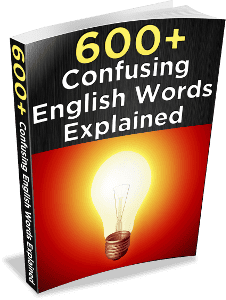
Image source: FreeDigitalPhotos.net
#6 – Meet / Know
Don’t say: “I knew him last year.”
Say: “I met him last year.”
Meet has two meanings:
- When you have first contact with a person
“I met him last year” - When you will encounter someone you already know. In this case, we often use “meet with” or “meet up with”
“I’m meeting up with some friends at the bar after work.”
Know has two different meanings/uses:
- With knowledge and skills in general
“He knows everything about computers.” - With knowing people in general
“Do you know Janet? She’s in the advanced English class.”
“No, I don’t think I know her.”
#28 – Wait / Hope / Expect
Don’t say: “I’m waiting my friend to call.”
Say: “I’m waiting for my friend to call.”
Wait = Pass the time until something happens
- It’s 6:45. I’m waiting for the 7:00 bus.
- We waited in line for three hours to get tickets to the concert.
- You need to wait for the computer to finish updating.
Don’t confuse “wait” with hope and expect:
Hope = Want something to happen
- I hope I’ll get a promotion this year!
- I’m sorry to hear you’re sick. I hope you get better soon!
- The traffic is very bad today. I hope I won’t be late.
Expect = Believe that something probably will happen.
- We’re expecting a visit from some clients – they said they would come at 4:30.
- My boss expects me to arrive on time every day.
#40 – Before / Ago / Back
Don’t say: “I sent the letter two months before.”
Say: “I sent the letter two months ago.”
Or: “I sent the letter two months back.” (informal)
Ago and back are used for past times from the present moment. Before is used for past times from another time in the past. Here are some examples of before:
- Yesterday I missed my train. I got to the train station at 7:10, but the train had left ten minutes before.
- I was very happy when I got this job last year, because I had lost my previous job six months before.
#92 – Raise / rise / arise
Don’t say: “The government is going to rise taxes.”
Say: “The government is going to raise taxes.”
Rise means “to go up” or “to increase” – by itself. There is only a subject; there is no object.
- The sun rises at 6:00 AM.
- Energy consumption rose 20% this year.
Raise means “to move something to a higher position” or “to increase something,” so there are two entities, the subject (which performs the action) and the object (the thing that is moved or increased):
- I raised my hand to answer the teacher’s question.
(subject = I; object = my hand) - The state is raising the minimum age to get a driver’s license – from 16 to 18.
(subject = the state; object = the minimum age to get a driver’s license)
Raise can also be used in a more metaphorical sense:
- He raised some objections to the project proposal.
(= he expressed the objections) - Our baseball team raised money for a local orphanage.
(= collected money from donations) - My parents raised their voices during the argument.
(= spoke louder) - The college is raising the bar for new applicants.
(= increasing the standards)
Arise is similar to rise, but is more formal and abstract. It can also be used to mean “appear” or “result from”:
- Several important questions arose during the meeting.
- I’d like to work in Japan, if the opportunity arises.
- A new spirit of hope has arisen among the country’s people.
- Sorry, I’ll need to cancel our appointment. A few problems have arisen.

